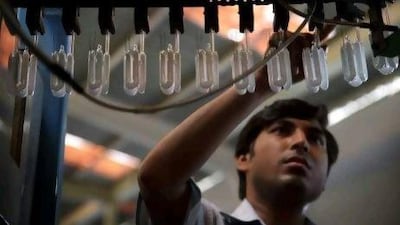NEW DELHI // India's central bank and the country's outgoing finance minister have announced measures intended to halt the rupee's fall and to strengthen the economy. But analysts have called these steps insufficient, in the absence of broader structural reform.
A circular issued yesterday by the Reserve Bank of India (RBI) detailed the measures: opening a further US$5 billion (Dh18.3bn) worth of government securities to registered foreign institutional investors (FIIs), allowing new classes of non-resident investors to buy government bonds, and making it easier for Indian businesses to repay their rupee loans.
In a reflection of market sentiments, the Bombay Stock Exchange lost 249 points from the Monday's trading high of 17,131.
The announcements were made a day before the resignation of India's finance minister, Pranab Mukherjee.
Mr Mukherjee leaves his ministry to run for president, as the Congress party's candidate. He will file his nomination papers on Thursday.
A replacement for Mr Mukherjee has not been announced, but the prime minister, Manmohan Singh - a noted economist - could take on the finance portfolio himself.
The central bank will now allow the sale of government bonds to new types of non-resident investors: sovereign wealth funds, pension funds, insurance funds, and foreign central banks.
Indian manufacturers and businesses can also borrow more money overseas to repay rupee loans that were taken out for capital expenditure. The limit for such external commercial borrowings has been raised from $30bn to $40bn.
These measures would make borrowing and investing more attractive, M Natarajan, head of treasury at the Bank of Nova Scotia, told The National. But the central bank's "intervention in the currency market is still at the low end of what it can do".
"Broadening the base of investors, for example, won't have an effect incrementally tomorrow," he said. "These measures will have a direct but minimum effect on a day-to-day basis, but not meaningfully in the long term."
On his way back from the G20 summit in Mexico, Mr Singh said over the weekend that there would be no drastic action to stem the fall of the rupee, which hit an all-time low of 57.37 to the dollar on Friday afternoon.
"We are operating a system which is market-based exchange rate," Mr Singh said. "We intervene only to curb violent fluctuations."
Yesterday, the rupee opened at 56.73 to the dollar and closed at 57.10. Over the past year, the rupee has fallen 21 per cent, making it Asia's worst-performing currency over that period.
The depreciation has been driven, in part, for a mounting demand for the dollar the world over, as economic uncertainty persists in the United States, Europe and Asia.
But Mr Natarajan also pins some of the blame upon India's poor domestic performance and slowing growth, which have dragged down demand for the rupee.
In addition, economic growth has slowed to 6.5 per cent this fiscal year, and inflation hovered around 7.5 per cent in May.
"The investment climate has to be made more attractive in India," Mr Natarajan said. "If you are serious about 7-plus or 8-plus [per cent] GDP growth, you need to create infrastructure."
The slowing of India's economy has provided opposition parties, such as the Bharatiya Janata Party (BJP), further ammunition to attack a government whose tenure has already been riddled with corruption.
In an op-ed in the Economic Times yesterday, Yashwant Sinha, a member of the BJP and a former finance minister, wrote that Mr. Mukherjee had been a "resounding failure" and was leaving the economy "in deep crisis".
"Most of the indices are worse than in 1991 - the fiscal deficit, the revenue deficit, the current account deficit and inflation," Mr Sinha wrote. "Every sector of the economy is in crisis - agriculture, industry and the services sector."
The opposition's presidential candidate, P A Sangma, has also blamed Mr Mukherjee for India's economic situation.
"If the rupee is at an all-time low, if the international rating for credit has been downgraded, [if there is] so much of corruption, who is responsible?" Mr Sangma told the Press Trust of India on Sunday. "Individually, it is the finance minister who is responsible for price rise, for corruption, for devaluation of money ... Collectively the prime minister and his cabinet, but individually it is the finance minister's responsibility."
ssubramanian@thenational.ae

